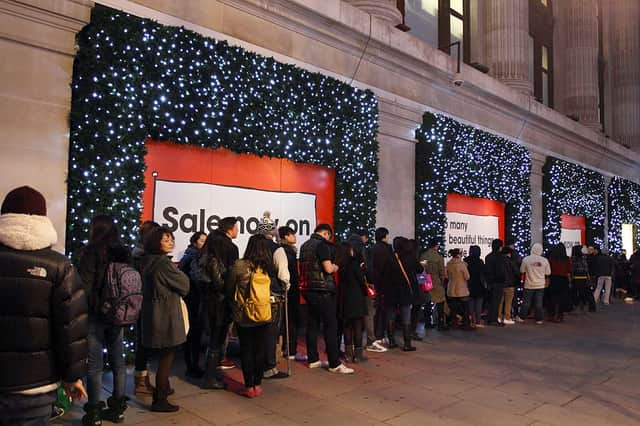This is why Boxing Day is called Boxing Day - and traditions explained


The day after Christmas Day can be an eventful one.
It is a day which sees many emerge from their Christmas cocoons after the non-stop festive fanfare of opening presents, clinking of glasses, turkey and the Queen’s speech.
A time for Santa Claus and his little helpers to put their feet up, take a break and reflect on the monumental effort which went into making this Christmas the best one yet.
Advertisement
Hide AdAdvertisement
Hide AdIt’s a Bank Holiday in the UK, just like Christmas Day, with many making a dash for the sales, stepping outside for long walks with friends and family or even attending a sporting event.
But why is 26 December called Boxing Day?
Here we explore its origins.
Why is Boxing Day called Boxing Day?
In spite of its name, there is no direct link to the sport of fisticuffs, repackaging of presents or even stuffing all your prized possessions into boxes ready for the big house move.
Instead, its name seems to stem from charitable acts from the Victorian age.
Traditionally, the day after Christmas Day was a day off for servants who would often receive a special festive box from their masters in recognition of their loyal service.
Advertisement
Hide AdAdvertisement
Hide AdHaving upheld their duties on Christmas Day, the servants would return home to see their families with boxes of gifts, sometimes money and leftover food from their masters.
The theory has stood the test of time thanks, largely, to Charles Dickens’ tale of Ebenezer Scrooge in the 1843 novel A Christmas Carol.
This gesture from employer to employee can still be considered ongoing, with some employers distributing Christmas bonuses to its staff to this day.
Is there an alternative theory as to why Boxing Day is called Boxing Day?
Advertisement
Hide AdAdvertisement
Hide AdAnother theory comes from churches that would collect charitable donations - often money - from parishioners during the Advent season and store them in alms boxes.
The boxes would then be opened by clergy members at Christmas and the contents distributed to those less fortunate the day after, on Boxing Day.
The sentiment remains to this day, with many churches passing around a box for people to put envelopes of cash into for charitable causes over the festive season.
Is there a religious connection to Boxing Day?
The day, much like Christmas, has religious connections and is the celebration of St. Stephen who was the first Christian martyr known for acts of charity.
Advertisement
Hide AdAdvertisement
Hide AdIreland and the Catalonia region of Spain celebrate Boxing Day as Saint Stephen’s Day and is a big part of a season that promotes the act of giving and selfless deeds.
Countries such as Germany, Poland and Hungary go a little further and celebrate the 26 December as a second Christmas Day.
Around the UK, Boxing Day remains a special time of the year for so many people who make the effort to see friends and loved ones over the festive season.
What are some Boxing Day traditions?
Traditions can vary from household to household - and there might be a few new ones this year as the country prepares for a ‘Covid Christmas’ - but largely rotate around spending time with those closest to you, either in person or via video calls.
Advertisement
Hide AdAdvertisement
Hide AdThe traditional Boxing Day football is scheduled to still go ahead, with the hope of some spectators being allowed into the grounds, as well as the chance to watch on TV.
Cricket loving nation Australia celebrate by hosting an annual match between their national team and a touring side at the Melbourne Cricket Ground, known as the Boxing Day Test.
Others opt for a dash to find a bargain in the Boxing Day sales. Scenes in previous years have seen queues outside of UK retailers’ doors and shopping centres.
While it remains a popular excursion, there are other discount days in the lead up to Christmas, such as Black Friday, which has also attracted many savvy shoppers.
When is Boxing Day 2020?
Boxing Day, the 26 December, falls on a Saturday this year, meaning Monday 28 December is a Bank Holiday.
